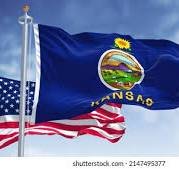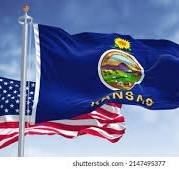Kansas has produced many notable figures across various fields. Here are some of the most famous Kansans:
Politics & Leadership
• Dwight D. Eisenhower – 34th U.S. President and World War II Supreme Allied Commander, born in Abilene.
• Amelia Earhart – Pioneering aviator, the first woman to fly solo across the Atlantic, born in Atchison.
• Bob Dole – Longtime U.S. Senator and 1996 Republican presidential nominee, from Russell.
Entertainment & Arts
• Buster Keaton – Silent film actor and comedian, born in Piqua.
• Hattie McDaniel – First Black actress to win an Academy Award (for Gone with the Wind), born in Wichita.
• Dennis Hopper – Actor and filmmaker (Easy Rider), born in Dodge City.
• Kirstie Alley – Actress (Cheers), born in Wichita.
• Paul Rudd – Actor (Ant-Man), raised in Lenexa.
Music & Literature
• Joe Walsh - Rock singer and guitarist (Eagles), born in Wichita.
• Melissa Etheridge – Rock singer-songwriter, born in Leavenworth.
• Charlie Parker – Jazz saxophonist and bebop pioneer, born in Kansas City, KS.
• Langston Hughes – Influential Harlem Renaissance poet and writer, raised in Lawrence.
Sports
• Walter Johnson, Hall of Fame pitcher, born in Humboldt.
• Barry Sanders – Legendary NFL running back (Detroit Lions), from Wichita.
• Gale Sayers – Hall of Fame NFL running back (Chicago Bears), from Wichita.
• Wilt Chamberlain – Basketball legend who played at the University of Kansas before dominating the NBA.
Kansas has a rich history of producing influential figures across different fields, leaving a lasting impact on American culture and history.
SOURCE: Kansas Tourism
BY KEITH LIPPOLDT
klippoldt@gbtribune.com
The date Jan. 29, 1861, marked a historic day as Kansas officially became the 34th state of the United States. The journey to statehood was overflowing with conflict, primarily over the issue of slavery. The Kansas-Nebraska Act of 1854 had allowed settlers to determine whether the territory would permit slavery, leading to violent clashes between pro-slavery and anti-slavery factions in a period known as “Bleeding Kansas.” The turmoil delayed Kansas’ admission to the Union for years as multiple state constitutions were proposed and rejected. However, with the secession of Southern states and the growing strength of the anti-slavery movement, Congress finally approved Kansas’ free-state constitution. President James Buchanan signed the bill, paving the way for Kansas to enter as a free state, just months before the Civil War erupted.
Kansas’ path to becoming the state it is today was shaped by additional significant events. Following its admission to the Union in 1861, Kansas played a crucial role in the Civil War, sending thousands of soldiers to fight for the Union cause. After the war, the state became a key destination during the westward expansion, with cattle drives, railroads, and homesteaders transforming the landscape. The construction of rail lines also fueled economic growth and brought new settlers.
The early 20th century saw the rise of aviation, with Wichita earning the title of “Air Capital of the World” due to its booming aircraft industry. The Dust Bowl of the 1930s tested the resilience of Kansans, creating medical issues, devastating farms and forcing many to migrate, but the state rebounded with agricultural advancements. Civil rights also helped define Kansas, as the landmark 1954 Supreme Court case Brown v. Board of Education of Topeka helped end racial segregation in public schools. From frontier battles to aviation innovation and social justice, Kansas’ history is a testament to perseverance and progress.
SOURCE: History.com,





